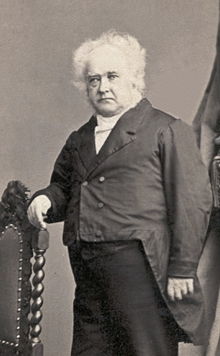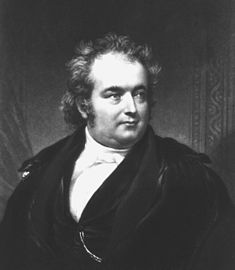| James Mapes | |
|---|---|
 | |
| Born | (1806-05-29)May 29, 1806 New York City, US |
| Died | January 10, 1866(1866-01-10) (aged 59) New York City, US |
| Scientific career | |
| Fields | Agriculture, chemistry |
James Jay Mapes (May 29, 1806 – January 10, 1866) was an American chemist, inventor and educator, mostly known for his achievements in scientific agriculture.
Biography
Mapes was born in New York on May 29, 1806. His father, Jonas Mapes, was a major-general in command of the New York state forces in and around New York in the year 1812. Nearly all his ancestors on the father's side were farmers on Long Island, back to 1640, when Thomas Mapes came from England and settled there. In his early years, James showed passion for chemistry, invention and military matters. From the age of 11, for a few years, he studied at the classical school of Timothy Clowes at Hempstead, Long Island, while living with renowned English reformer William Cobbett. When only seventeen years of age he delivered a full course of lectures in New York on "Military Tactics".
Later Mapes became known as an analytical chemist, and his analyses of beer and wines, made at requests of the senate of New York and the temperance societies, were regarded as standard experiments. He was one of the first manufacturer of magnesium sulfate from magnesium hydrobisilicate and the author of many improvements in tempering steel, distilling, dyeing, and other areas. In 1832 he invented a new system of sugar refining and later an apparatus for manufacturing sugar from the cane. He was the inventor of processes for tanning leather and the manufacture of sugar from West India molasses. He also designed a centrifugal machine for separating molasses from sugar.
Soon after the organization of the National Academy of Design in New York he was appointed professor of chemistry and natural philosophy to that institution. Subsequently, he was appointed professor of chemistry and natural philosophy to the American Institute. In 1844 he was elected president of the Mechanics' Institute of New York. He was one of the founders of the National Agricultural Society, and held the position of vice-president of the American Institute, with which he had been actively connected for at least 25 years. He was made a permanent member of the New York Lyceum of Natural History, and of the National Institute at Washington, and an honorary member of the Scientific Institute of Brussels, Royal Society of Saint Petersburg, Geographical Society of Paris, Artists' Fund Society of Philadelphia, and several horticultural and agricultural societies of Europe and America.
In 1847, Mapes moved to New Jersey, bought a farm there, near Irvington, and devoted himself to scientific agriculture, particularly fertilizers (the "Mapes Fertilizer" patented in 1859), drainage, crop rotation and seeding. He was actively popularizing his agricultural methods, via public exhibitions at his farm. In Newark, New Jersey, Mapes organized the Franklin Institute and was its first lecturer. In July 1851, he became associate editor of the Journal of Agriculture, a semimonthly edition started in Boston. As a writer he was distinguished for terseness and simplicity of style.
Mapes was one of the earliest American converts to Spiritualism. His interest began as an attempt to disprove the "imbecility" of the concept, but he became convinced that "spirits can and do communicate with mortals, and in all cases evince a desire to elevate and advance those they commune with."
Family

At the age of twenty-one Mapes married a Long Island lady, Sophia Furman, two years his junior, daughter of the Judge Garret Furman, of Maspeth, Long Island. They had at least four children:
- Mary Mapes Dodge, born Mary Elizabeth Mapes (January 26, 1831 – August 21, 1905), an American children's writer and editor
- Sophy Mapes Tolles, an artist
- Catherine T. Bunnell
- Charles Victor Mapes (July 4, 1836 – January 23, 1916), an agriculture scientist and engineer, the originator of the "Mapes Complete Manure", and a member of the New Jersey State Board of Agriculture and the American Chemical Society. For many years since 1877 he was vice-president and general manager of "The Mapes Formula and Peruvian Guano Company", a stock company established in New York in 1877.
References
![]() This article incorporates text from this source, which is in the public domain: Biographical and genealogical history of the city of Newark and Essex County, New Jersey. 1898.
This article incorporates text from this source, which is in the public domain: Biographical and genealogical history of the city of Newark and Essex County, New Jersey. 1898.
- Maxine N. Lurie; Marc Mappen (April 2004). Encyclopedia of New Jersey. Rutgers University Press. p. 499. ISBN 978-0-8135-3325-4. Retrieved 25 September 2011.
- ^ Biographical and genealogical history of the city of Newark and Essex County, New Jersey. New York and Chicago: The Lewis publishing company. 1898.
- J. J. Mapes "Improvement in fertilizers" U.S. patent 26,507 issued December 20, 1859
- Charles Victor Mapes; James Jay Mapes; W.C. Moore & Co (1860). Mapes' nitrogenized superphosphate of lime: Large medal awarded by the American Institute, 1859. Patented 1859. Guaranteed uniformity of quality. Superior to Peruvian guano. ...
- ^ Harvard College (1780- ). Class of 1857; George McKean Folsom; Francis Henry Brown (1882). Report of the Class of 1857 in Harvard College: prepared for the twenty-fifth anniversary of its graduation. J. Wilson and Son.
{{cite book}}: CS1 maint: numeric names: authors list (link) Goole books - Encyclopedia.com.
- Tymn, M. n.d. Distinguished researchers found evidence for survival. Lightlink. Retrieved March 31, 2007,.
- William Roscoe Thayer; William Richards Castle; Mark Antony De Wolfe Howe; Arthur Stanwood Pier; Bernard Augustine De Voto; Theodore Morrison (1916). The Harvard graduates' magazine. Harvard Graduates' Magazine Association. p. 534.